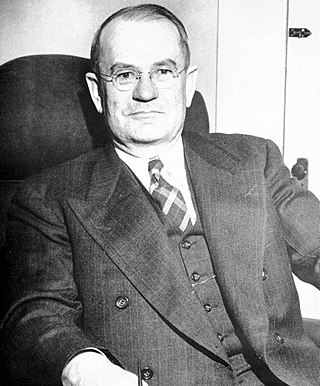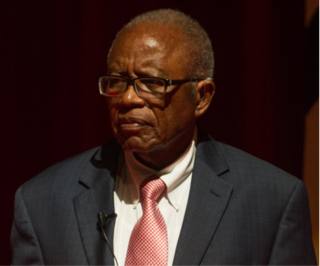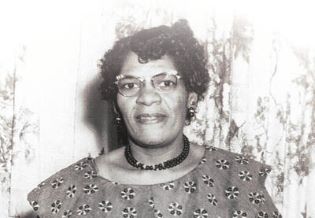Related Research Articles

Rosa Louise McCauley Parks was an American activist in the civil rights movement, best known for her pivotal role in the Montgomery bus boycott. The United States Congress has honored her as "the first lady of civil rights" and "the mother of the freedom movement".

Abbeville is a city in and the county seat of Henry County, in the southeast part of Alabama, United States. It is part of the Dothan, Alabama Metropolitan Statistical Area. At the 2020 census, the population was 2,358.

Claudette Colvin is an American pioneer of the 1950s civil rights movement and retired nurse aide. On March 2, 1955, she was arrested at the age of 15 in Montgomery, Alabama, for refusing to give up her seat to a white woman on a crowded, segregated bus. It occurred nine months before the similar, more widely known incident in which Rosa Parks, secretary of the local chapter of the National Association for the Advancement of Colored People (NAACP), helped spark the 1955 Montgomery bus boycott.

The Montgomery bus boycott was a political and social protest campaign against the policy of racial segregation on the public transit system of Montgomery, Alabama. It was a foundational event in the civil rights movement in the United States. The campaign lasted from December 5, 1955—the Monday after Rosa Parks, an African-American woman, was arrested for her refusal to surrender her seat to a white person—to December 20, 1956, when the federal ruling Browder v. Gayle took effect, and led to a United States Supreme Court decision that declared the Alabama and Montgomery laws that segregated buses were unconstitutional.

George Chauncey Sparks, known as Chauncey Sparks, was an attorney and Democratic American politician who served as the 41st Governor of Alabama from 1943 to 1947. He improved the state education of whites and expanded the state schools and centers for agriculture. He campaigned for passage of the Boswell Amendment to the state constitution, which was designed to keep blacks disfranchised following the US Supreme Court ruling Smith v. Allwright (1944) against the use of white primaries by the Democratic Party in the states.

Edgar Daniel Nixon, known as E. D. Nixon, was an American civil rights leader and union organizer in Alabama who played a crucial role in organizing the landmark Montgomery bus boycott there in 1955. The boycott highlighted the issues of segregation in the South, was upheld for more than a year by black residents, and nearly brought the city-owned bus system to bankruptcy. It ended in December 1956, after the United States Supreme Court ruled in the related case, Browder v. Gayle (1956), that the local and state laws were unconstitutional, and ordered the state to end bus segregation.

Joan Little is an African-American woman who was charged with the 1974 murder of Clarence Alligood, a white prison guard at Beaufort County Jail in Washington, North Carolina, who attempted to rape Little before she could escape. Her case became a cause célèbre of the civil rights, feminist, and anti-death penalty movements. Little was the first woman in United States history to be acquitted using the defense that she used deadly force to resist sexual assault. Her case also has become classic in legal circles as a pioneering instance of the application of scientific jury selection.
Browder v. Gayle, 142 F. Supp. 707 (1956), was a landmark federal court case that ruled that segregation on public transportation was unconstitutional. The case was heard before a three-judge panel of the United States District Court for the Middle District of Alabama on the segregation of Montgomery and Alabama state buses. The panel consisted of Middle District of Alabama Judge Frank Minis Johnson, Northern District of Alabama Judge Seybourn Harris Lynne, and Fifth Circuit Court of Appeals Judge Richard Rives. The main plaintiffs in the case were Aurelia Browder, Claudette Colvin, Susie McDonald, and Mary Louise Smith. Their attorney, Fred Gray, also approached Jeanetta Reese to join the suit, but intimidation by segregationists caused her to withdraw.

The Rosa Parks Story is a 2002 American television movie written by Paris Qualles and directed by Julie Dash. Angela Bassett portrays Rosa Parks, with Cicely Tyson in a supporting role as her mother. It was broadcast by CBS on February 24, 2002. It received awards from the NAACP and the Black Reel Awards.

Fred David Gray is an American civil rights attorney, preacher, activist, and state legislator from Alabama. He handled many prominent civil rights cases, such as Browder v. Gayle, and was elected to the Alabama House of Representatives in 1970, along with Thomas Reed, both from Tuskegee. They were the first black state legislators in Alabama in the 20th century. He served as the president of the National Bar Association in 1985, and in 2001 was elected as the first African-American President of the Alabama State Bar.

Johnnie Rebecca Daniels Carr was a leader in the Civil Rights Movement in the United States from 1955 until her death.

Aurelia Shines Browder Coleman was an African-American civil rights activist in Montgomery, Alabama. In April 1955, almost eight months before the arrest of Rosa Parks and a month after the arrest of Claudette Colvin, she was arrested for refusing to give up her bus seat to a white rider.

Jeremiah Reeves was a 22-year-old African American, a former jazz drummer, who was executed by the state of Alabama by electrocution after being convicted of raping a white woman in 1952. At the time of the events, Reeves was 16 years old, working as a grocery delivery boy; at his trial, he denied having had sex with the white woman. His sentence and execution were considered unjust, outsize for the crime, and a large protest had formed by the time he was executed, after appeals.

Recy Taylor was an African-American woman from Abbeville in Henry County, Alabama. She was born and raised in a sharecropping family in the Jim Crow era Southern United States. In the 1940s, Taylor's bravery in speaking out about her rape by white men led to organizing in the African-American community for justice and civil rights.
Betty Jean Owens is an African American woman who was brutally raped by four white men in Tallahassee, Florida in 1959. Her trial was significant in Florida, and the South as a whole, because the white men were given life sentences for their crimes. Prior to Owens' case, sentences of this severity had not been imposed in the South on white men accused of raping black women. For example, in the case of Recy Taylor, who was gang-raped by six white men in Alabama, the men were never found guilty of any charges and released from jail with minimal fines.

Rosa Parks Day is a holiday in honor of the civil rights leader Rosa Parks, celebrated in the U.S. state of Missouri on her birthday, February 4, in Michigan and California on the first Monday after her birthday, and in Ohio and Oregon on the day she was arrested, December 1.
Viola White (1911–1954) was an African-American woman who lived in Montgomery, Alabama and is best known for her resistance to segregated bus laws. At 35 years old, in 1944, White was arrested for refusing to give up her seat. White's arrest occurred a decade before Rosa Parks' similar act of resistance, which is credited for starting the Montgomery Bus Boycott. White worked at Maxwell Air Force Base.

Nancy Florence Buirski was an American filmmaker, producer, and photographer. She wrote, directed, and produced the documentary films A Crime on the Bayou (2020) and Desperate Souls, Dark City and the Legend of Midnight Cowboy (2022).

Transit Equality Day or "Transit Equity Day" is a holiday in honor of the civil rights leader Rosa Parks, celebrated in the United States on her birthday, February 4.
The Alabama Tribune was a newspaper published in Montgomery, Alabama in the US. According to the Library of Congress' website it was established in the 1930s and ceased publication in the 1960s. Newspapers.com has archives of the paper from 1946 to 1964.
References
- ↑ Danielle L. McGuire, At the Dark End of the Street: Black Women, Rape, and Resistance--a New History of the Civil Rights Movement from Rosa Parks to the Rise of Black Power (New York: Vintage Books, 2011) 23.
- ↑ Jeanne Theoharis, The Rebellious Life of Mrs. Rosa Parks (Boston: Beacon Press, 2013) 23.
- ↑ McGuire, At the Dark End of the Street, 22.
- ↑ McGuire, At the Dark End of the Street, 26.
- ↑ McGuire, At the Dark End of the Street, 31.
- ↑ Fred Atwater, "$600 To Rape Wife? Ala. Whites Make Offer To Recy Taylor Mate!: Victim of White Alabama Racists," The Chicago Defender (National edition) Jan 27, 1945; "Alabama Authorities Ignore White Gang's Rape of Negro Mother," The Worker, November 19, 1944.
- ↑ McGuire, At the Dark End of the Street, 5-6.
- ↑ McGuire, Danielle L. At the Dark End of the Street: Black Women, Rape, and Resistance- a New History of the Civil Rights Movement from Rosa Parks to the Rise of Black Power. New York: Vintage Books, 2011.
- ↑ Fred Atwater, "$600 To Rape Wife? Ala. Whites Make Offer To Recy Taylor Mate!: VICTIM OF WHITE ALABAMA RAPISTS," The Chicago Defender (National edition) Jan 27, 1945.
- ↑ McGuire, At the Dark End of the Street, 13.
- ↑ McGuire, At the Dark End of the Street, 26.
- ↑ McGuire, At the Dark End of the Street, 19.
- ↑ "Grand Jury Won't Reopen Recy Taylor Case," The Chicago Defender, October 6, 1945.
- ↑ "To Probe Attack on Ala. Woman," The Afro-American, December 23, 1944.
- ↑ "Recy Taylor Group Seeks Indictment," The Afro American, February 3, 1945.
- ↑ McGuire, At the Dark End of the Street, 27.
- ↑ Gordy, Cynthia (February 9, 2011). "Recy Taylor: A Symbol of Jim Crow's Forgotten Horror". The Root. Retrieved April 29, 2022.
- ↑ Sikivu Hutchison, “Recy Talyor and the Atrocious Legacy of All-White Juries.” The Huffington Post, 10 Nov. 2015.
- ↑ McGuire, At the Dark End of the Street, 28.
- ↑ McGuire, At the Dark End of the Street, 42.
- ↑ Theoharis, The Rebellious Life, 94-5.
- ↑ Cynthia Gourdy, "Recy Taylor Speaks on Alabama Apology," The Root, May 12, 2011.